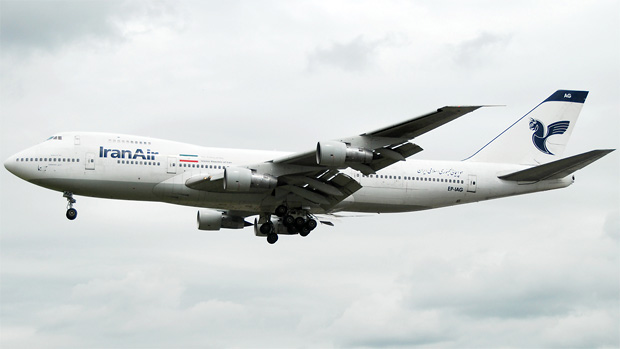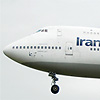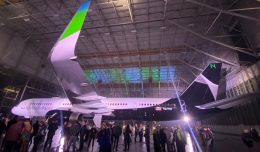
An Iran Air 747-200 (EP-IAG) seen on final to Runway 27 at London-Heathrow. (Photo by Gordon Gebert)
A majority of Iran Air’s fleet was added to the European Commission’s infamous “List of Airlines Banned in the EU” on Tuesday. European Commission transport officials released a statement indicating the restrictions are based on the results of inspections of Iran Air aircraft visiting the EU, as well as an on-site inspection of facilities in Iran.
A total of 42 of the Tehran-based carrier’s over 60 planes, including all of its Boeing 727 and 747 aircraft, along with its entire Airbus A320 fleet, are banned from flying to airports in EU member countries. The airline has had difficulty purchasing parts for the aircraft as a result of trade restrictions imposed by the United States, as well as sanctions recently implemented by the United Nations Security Council.
Fourteen Airbus A300s, eight Airbus A310s and two Boeing 737s are excluded from the list. EU inspectors will continue to inspect these planes when they land in Europe.
Iran Air serves 13 cities in Europe, including London-Heathrow (LHR), Paris-Orly (ORY) and Amsterdam-Schiphol (AMS). Airline officials told the NY Times that they would shift the non-blacklisted aircraft to their European routes and that schedules would be unaffected.
Iran Air European Schedule Update, courtesy of airlineroute.net
Tehran – Cologne A300B4 replace A320
Tehran – Copenhagen A300B4 replace A310
Tehran – Gothenburg A300-600R replace 747SP
Tehran – Hamburg Day 2 service operates with A300B4, replace 747SP
Tehran – London Heathrow A300-600R replace 747SP on all 4 weekly service
Tehran – Milan Malpensa A310 operation, replace A320
Tehran – Vienna A300B4/A310 replace A320
On Monday, in a possible effort to preemptively divert attention from the blacklisting, Iran accused the United Kingdom, Germany, and the United Arab Emirates (UAE) of refusing to provide fuel to Iranian passenger planes after U.S. unilateral sanctions against the Iran over their nuclear program, the BBC reported.
The United Kingdom has said that it was not aware of any refusal to refuel Iranian planes and Germany made clear that there was no ban. Oil firms that were contacted by BBC said they could not comment on individual contracts.
Press TV, an Iranian owned global news network located in Tehran, Iran, reported that “Following the ratification of the U.S. unilateral sanctions against Iran, airports in Britain, Germany, Kuwait, and the UAE have declined to offer fuel to Iranian passenger planes flying through their airspace since Thursday,” quoting the Secretary of Iran’s Airlines Union Mehdi Aliyari.
Aliyrai continued, saying that air transportation is an international activity and that all sanctions against Iran contradict the international aviation rules and human rights. He also said that U.S. unilateral sanctions are illegal and beyond the U.N. Security Council resolution laid out in June, Aliyari said that the International Civil Aviation Organization (ICAO) should investigate the matter.
However, following his remarks, Germany and the UAE staunchly denied that they had stopped supplying Iranian planes with fuel. Iranian lawmaker Hesmatollah Falahatpisheh said that Iran would retaliate, warning that they would do the same to the “ships and planes of those countries that cause problems for us.”
U.S. sanctions now prohibit the sale or provision to Iran of refined petroleum products worth more than $5 million over the course of a year. Some speculate that it might be that fuel companies are worried their sales over a year may add up to that $5 million, and receive a possible ban on doing business with the United States.
BNO News contributed to this report







